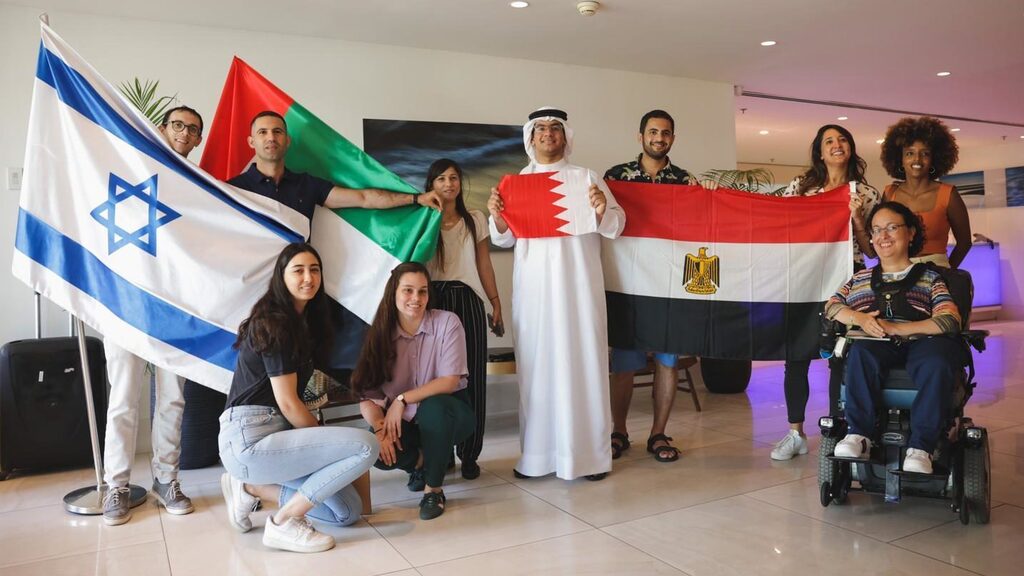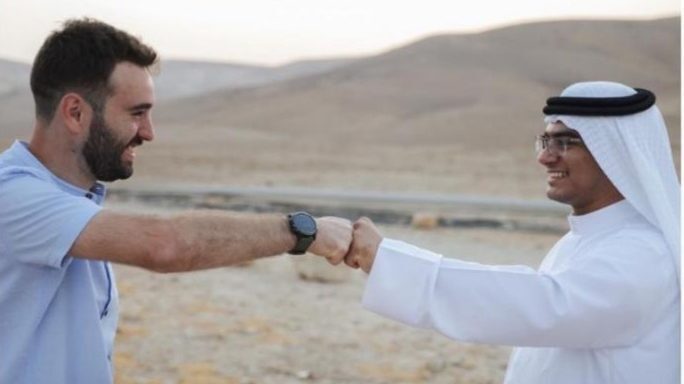Getting your Trinity Audio player ready...
Twenty-year-old Yousif Mohamed of Bahrain, aka @Yousifmohd2 on Instagram, is one of the first Bahrainis to visit to Israel.
The social media influencer, who lives with his family in the kingdom’s capital city Manama and hopes to work on tourism development overseas, is used to documenting his life over the internet and has braced for the repercussions of posting pictures of himself in Israel.
2 View gallery


Young influencers from the Arab world meet with Israeli counterparts in a visit organized by the Israel-Is organization
(Photo: Itamar Eyal)
“I am young, but you’re never too young to want to try and change the world,” says Mohamed.
“I faced a bit of pressure and criticism online probably due to being one of the first Bahrainis to visit Israel, but I think it’s expected that people need some time to open their minds," he says.
“Ignorance can sometimes hinder us and it was because of this that I decided to visit and see things for myself, and I’m really happy that I’ve taken that step.”
Mohamed is one of 25 social media influencers from three countries that recently signed the Abraham Accords who met in Israel to find common ground with Israelis and act as emissaries for peace.
In a trip that was originally scheduled during last month’s Gaza-Israel fighting, young people from the United Arab Emirates, Bahrain and Morocco flew home from Israel on Sunday after a week-long tour of the country.
The visit was organized by Eyal Biram, the founder of the Israel-Is nonprofit established four years ago to enhance Israel’s ties to other countries through encounters between young people.
The trip, coming in the wake of the cross-border violence between Gaza and Israel, caused some of the non-Israeli participants to drop out.
Biram said the conflict dominated the news in the Arab world, causing some to feel pressure not to go for political reasons or out of fear for their safety.
“Of course, it’s going to change the number of participants,” Biram says. He did not respond to a question about how many participants had canceled.
“There is still wide support from the government of Bahrain and the UAE, but on the ground, especially on the social media level, we see a massive effect,” he says.
“Some of the participants were afraid to come. The people who did go have a lot of courage because they believe in what they’re doing, and they understand the importance of being here.”
The Israel-Palestinian conflict was addressed as the group of influencers met with different Arab and Jewish leaders.
“We waited until the conflict ended and then we went to see the true picture,” says Saoud Saqer, a participant from Abu Dhabi who works as an engineer.
The 30-year-old influencer had 10,000 followers on his old Instagram account but had to create a new one in Israel after his account got spammed.
“They want to make things better now and they want to show the world that they’re trying to be the people of peace, they don’t want the world to have the wrong idea perspective of them and I’m talking here about the people themselves, not the government,” Saqer says of the Israelis he met.
“I’m not saying that since the establishment of the State of Israel, everything was fine. … I have spoken to many Israelis that agree with me,” he says.
“They say that we were not perfect and a lot of complicated situations arose.”
The Emirati social media influencer has also faced pushback online over the trip.
“There are negative comments … from people who don’t want peace to prosper,” Saqer says, insisting the criticism had “zero impact” on him.
“I’m a goal-oriented person; We are on a mission to spread peace so regardless of the negative comments, we are going to keep going.”
Saqer’s favorite experience in Israel was visiting Al-Aqsa Mosque in Jerusalem, the site of recent heavy clashes between Muslims and police.
While the trip did not change his “actual perspective” on the Israel-Palestinian conflict, Saqer says he feels that the group can make positive steps toward peace.
“We are talking like the people of now, we want to make things better in the present time,” he says, adding that the trip helped him become more informed about Israelis.
“I got more educated about Israelis because the general idea is that they are more Western, but I came to see that they are more Middle Eastern than Western,” he says.
One lesson that Saqer wants to take back with him to Emiratis who have not been to Israel is that Israelis come from all different backgrounds.
“Israel is a nation, it’s a country; it’s not a race and it’s not an ethnicity. … Within that state, there are Muslims, Jews, Christians, and all of them share their love for the land and for the state of Israel. There are even Israeli [Jews] who have an Arab background,” he says.
“I want the world to know the State of Israel is diverse: there are Arabs and Muslims who are working in Israel’s health department, the police, in the army.”
Mohamed was also surprised to learn about the many cultural differences within Israel and that all Israelis are not like the ones he has seen on TV.
“It’s completely different from what you see in mainstream media. They aren’t people who want death to Arabs. … In fact, they live with Arabs like their brothers,” he says.
Mohamed wants to take back to Bahrain the message to not stereotype a whole country by the actions of some individuals.
“Never look at the small 0.1% of the population and judge the rest based on that,” he says.
Despite the setback of the Gaza conflict, Biram characterizes the trip as a “huge success,” with plans for more such trips to Israel and for activities within the group.
“We are creating, in our groups, leaders who are involved for the long term,” he says.
This is buttressed by the “Leaders of Tomorrow” online group, with hopes of building one-on-one connections for Israelis with individuals in countries that both have and lack peace treaties with Israel.
For both Saqer and Mohamed, this first visit to Israel will be one they will never forget. While learning about Israel, they also have things that they want Israelis to know about their respective countries.
“Israelis are all welcome to visit here and experience the culture,” Saqer says of Bahrain, noting that it is safe to do so.
“Bahrainis are friendly, polite, simple and welcoming people but we take honor and respect very seriously. We love to learn about new cultures and our tolerance comes from existing in a very multicultural country, with about a 50/50 ratio of local to expatriate population in our kingdom,” Mohamed says.
“We have a Jewish community and a synagogue since the late 19th century.”


